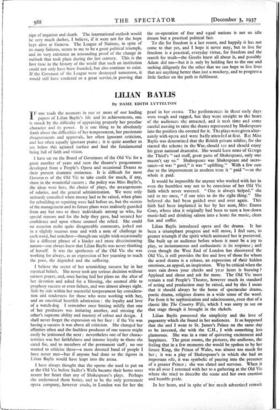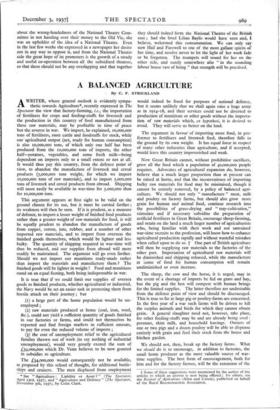LILIAN BAYLIS
By DAME EDITH LYTTELTON IF one reads the accounts in one or more of our leading papers of Lilian Baylis's life and its achievements, one is struck by the difficulty of appraising properly her peculiar character and its power. It is one thing to be absolutely frank about the difficulties of her temperament, her passionate disagreements and approvals, her often ignorant criticism, and her often equally ignorant praise ; it is quite another to see below this agitated surface and find the fundamental being full of faith and vision.
I have sat on the Board of Governors of the Old Vic for a great number of years and seen the theatre's programmes developed from a People's Opera and occasional Drama to their present dramatic eminence. It is difficult for most Governcrs of the Old Vic to take credit for much, if any, share in the wonderful success ; the policy was Miss Baylis's, the ideas were hers, the choice of plays, the arrangements of salaries, and the general administration. We were only seriously consulted when money had to be raised, when plans for rebuilding or repairing were laid before us, but the secrets of the management and its future plans were zealously guarded from any but two or three individuals- among us who, for special reasons and for the help they gave, had secured her confidence and upon whose counsel she relied. She could on occasion make quite disagreeable comments, jerked out in a slightly raucous tone and with a note of challenge in each word, but somehow—though one might wish occasionally for a different phrase of a kinder and more discriminating nature—one always knew that Lilian Baylis was never thinking of herself. It was the apotheosis of the Old Vic she was working for always, as an expression of her yearning to reach the poor, the degraded and the suffering.
I believe the secret of her astonishing success lay in her mystical beliefs. She never took any serious decision without earnest prayer, and, once having laid her plans on the altar of her devotion and asked for a blessing, she seemed able to prophesy success or even failure, and was almost always right. Side by side within her masterful temperament lay considera- tion and tenderness for those who were working with her, and an uncritical heartfelt admiration : the loyalty and loie of a watch-dog. I remember once hinting mildly that one of her producers was imitating another, and missing the other's supreme ability and mastery of colour and design. I shall never forget the expression on her face : if the Vic was having a success it was above all criticism. She changed her affinities often and the faultless producer of one season might easily be jettisoned the next : nevertheless one of her charac- teristics was her faithfulness and intense loyalty to those she cared for, and to members of the permanent staff ; no one wanted to criticise these—a more devoted band of people I have never met—but if anyone had done so the tigress in Lilian Baylis would have leapt into the arena.
I have always thought that the operas she used to put on at the Old Vic before Sadler's Wells became their home were nearer her heart than any of Shakespeare's plays. Perhaps she understood them better, and to be the only permanent opera company, however crude, in London was for her the pearl in her crown. The performances in those early days were rough and ragged, but they went straight to the heart of the audiences she attracted,- and it took time and some careful nursing to raise the drama represented by Shakespeare into the position she coveted for it. The plays were given alter- nately with opera and were badly attended at first. Bat Miss Baylis was determined that the British private soldier, for she started the scheme in the War, should see and should enjoy his great national dramatist. She would have none of George the Third's " sad stuff, great parts of Shakespeare, only one mustn't say so." Shakespeare was Shakespeare and sacro- sanct—it was " good," it was " uplifting." With a few cuts due to the improvement in modern taste it " paid "—on the whole it paid.
It would be impossible for anyone who worked with her in even the humblest way not to be. conscious of her Old Vic faith which never wavered. " One is always helped," she said to me once, " if one tries to do the right thing." She believed she had been guided over and over again. This faith had been implanted in her by her aunt, Miss Emma Cons, whose idea it originally had been to turn a low-down music-hall and drinking saloon into a home for music,- clean fun and coffee.
Lilian Baylis introduced opera and the drama. It has been a triumphant progress- and will move, I feel sure, to greater triumph if the spirit which animated her is pregerved. She built up an audience before whom it must be a joy to play, so instantaneous and enthusiastic is its-response ;- and even though the West End of London has discovered the Old Vic, it still provides the fire and love of those for whom the acted drama is a release, an expression of their hidden emotions, an appeal, an inspiration. Why be critical when-the tears rain down your cheeks and your heart is burning ? Applaud and shout and ask for more. The Old Vic -must remain a real People's Theatre, however much its standard of acting and production may be raised, and by this I mean that it should always be the home of spectacular drama, poetic drama, religious drama in a wide sense of the word. Far from it be sophistication and salaciousness,, even that of a classic like The Country Wife, which I was sorry to see on that stage though it brought in the shekels.
Lilian Baylis possessed the simplicity and the love of pageantry which she found in her audiences. It so happened that she and I went to St. James's Palace on the same day to be invested, she with the C.H., I with something less glamorous. She was in a state of quivering excitement and happiness. The great rooms, the pictures, the uniforms, the feeling that in a few moments she would be spoken to by her future King, the Prince of Wales, was almost too much for her ; it was a play of Shakespeare's in which she had an important role, it was symbolic of passing into the presence of a greater Prince ; she was elated and nervous. When it was all over I returned with her to a gathering at the Old Vic where she tried to describe the scene and her own emotion and humble pride.
In her heart, and in spite of her much advertised remark about the wrong-headedness of the National Theatre .Com- mittee in not handing over their money to the Old Vic, she was an upholder of the idea of a National Theatre. Even in the last few weeks she expressed in a newspaper her desire not in any way to oppose it, and from the National Theatre side the great hope of its promoters is the growth of a steady and useful co-operation between all the subsidised theatres, so that there should not be any overlapping and that together they should indeed form the National Theatre of the British race ; had she lived Lilian Baylis would have seen and, I believe, welcomed this consummation. We can only say now Hail and Farewell to one of the most gallant spirits of her time, and resolve never to let the light of her work fade or be forgotten. The trumpets will sound for her on the other side, and surely somewhere afar " in the sounding labour house vast of being " that strength will be practised.



























































 Previous page
Previous page